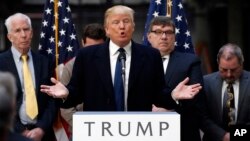Fresh off his sweep of three Democratic caucuses, Vermont Senator Bernie Sanders on Sunday declared his campaign has momentum and can now see a "path toward victory" over his rival, ex-Secretary of State Hillary Clinton.
"We are going to win this nomination process," a confident Sanders told ABC, a day after winning by large margins over Clinton in the western states of Washington, Hawaii, and Alaska.
Even with the victories, Sanders faces a difficult challenge in catching up to the frontrunner Clinton.
Clinton still leads by just under 300 pledged delegates, which are allocated according to voting results. She also has the support of most of the so-called super delegates, which are free to support any candidate.
Rejects calls to drop out
Many political observers have said Clinton's lead is insurmountable, and argue Sanders should drop out and allow her to focus on the eventual Republican presidential nominee. Sanders on Sunday rejected those calls.
"I think the momentum is with us," Sanders said on CNN. "A lot of these super delegates may rethink their positions with Secretary Clinton."
Sanders has won five of the last six states, all located in the western part of the country. Clinton dominated the southern states earlier in the nominating contest calendar.
Democrats compete next on April 5 in Wisconsin and again April 9 in the sparsely populated state of Wyoming. Clinton is focusing on April 19 when voters in New York, the state she once represented as a senator, decide how to allocate their 291 delegates.
Trump details foreign policy views
Meanwhile, the leading Republican candidate, Donald Trump, has outlined his foreign policy views in an extended interview with The New York Times. During a pair of telephone conversations totaling 100 minutes, he gave a fuller picture of what policies and initiatives he would pursue abroad if elected.
Trump says he would threaten to stop buying oil from Saudi Arabia and other Arab allies unless they commit ground troops to the fight against Islamic State or “substantially reimburse” Washington for fighting the militant group. He would also consider re-negotiating many fundamental treaties with U.S. allies, including the security pact with Japan, to make terms more favorable to the United States.
He said this could include allowing Japan and South Korea to build their own nuclear arsenals, asking countries to better compensate Washington for security agreements backed by U.S. armed forces and creating an alternative to NATO focused on counterterrorism. He also said he would consider using trade to push back on China’s expansive territorial claims in the South China Sea.
Trump did not rule out spying on American allies, and he criticized the Iran nuclear deal, saying it was particularly wrong-headed because it freed up some $150 billion in Iranian funds, but did nothing to repeal the sanctions that bar most U.S. companies from striking trade deals with Tehran.






